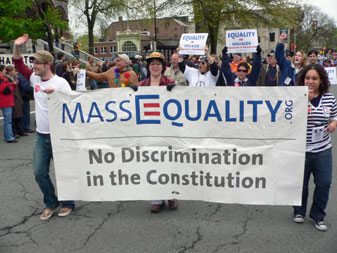A deeply devout friend of mine raised a key question about gay Catholic theologian James Alison’s discussion of the stoning of Achan in Joshua 7, which I had quoted in this post. Alison takes the story as an example of the kind of scapegoating Jesus intended us to move beyond, yet the story implies that God Himself sanctioned Achan’s death as the means to remove the people’s guilt.
Thus, my friend asked, “Whenever the Old Testament attributes a command, or some other kind of word, to God, are we called TODAY to take it on faith that God did indeed speak that word? Or do we have the option of seeing in the text a case of misunderstanding on the part of the Israelites as to what God actually said or meant?” Needless to say, this possibility undermines our confidence that any part of the Bible can be trusted as revelation.
She also suggested a less drastic option, which she attributed to Brian McLaren’s A Generous Orthodoxy. In his discussion of the “holy wars” in Joshua and Judges, which we find so troubling in our post-Crusades, post-Holocaust moral universe, McLaren reportedly says that God relates to us differently at different stages of human cultural evolution. As my friend summarizes this position, “God may command something that He knows is the only thing that will work in the present socio/spiritual/historical context, even though it is His desire and plan that His people will ultimately be able to transcend this way of being, as they find salvation and liberation in Jesus…just as the Old Testament law was not given to be permanent, but as a necessary tool for the people in that stage of their spiritual growth.” (Gal 3:24)
Thus we find ourselves once again between the Scylla of legalism and the Charybdis of situation ethics! In my opinion, McLaren’s solution is not without its risks, but I’ll take it every time over trying to justify acts that would be clearly evil if performed in our own day. Is it possible that not every action in the Bible is there for us to pass judgment upon? That God’s command to obliterate the Amalekites is not an occasion to debate “Go thou and do likewise: pro or con” but rather to practice the humility commended to us in Romans 14:4? “Who are you to judge someone else’s servant? To his own master he stands or falls.”
Where the self-styled orthodox are afraid we will go with this is the naive progressivism of some liberal defenders of gay rights, who uncritically assume that contemporary political values are the standard against which to judge the Bible. It was to such people that G.K. Chesterton addressed his great aphorism that tradition was the democracy of the dead. (Read the passage in context here.)
However, I do think that we have made progress beyond the mores of the Vikings in many ways, if not all, and that the Bible itself recognizes the idea of evolving standards, such that practices and concepts appropriate for one generation need not be defended for all time. “The Law was our schoolmaster until Christ came.” There is a way to recognize the superiority of your cultural moment on a particular issue, IN LIGHT OF the Christian standard. In other words, not because it is contemporary but because it actually lines up better with the values of the Bible itself.
So, to answer my friend’s original question, I think one can accept everything James Alison says without having to believe that the Bible inaccurately records what God said to THOSE people at THAT time.
Yet we also don’t have to believe, contra certain conservatives/evangelicals, that all the mores and circumstances that pertained during a particular episode of revelation should be replicated by all future generations. E.g. if St. Paul mentions in passing, in service of a wholly different point, the assumption that certain same-sex practices are immoral, we are free to reopen the question based on new information about what those practices actually are and whether that understanding of morality brings people closer or further away from love of God and neighbor.
Category Archives: Episcopal
Open Questions About Open Communion
A couple of years ago, my church switched from “all baptized Christians” to “all those worshipping with us” being invited to receive the sacraments, a practice that I hear is not uncommon among liberal churches. This change upset some traditionalists while making others, including my multi-religious family, feel more welcome. I’m content with the current policy, though I wouldn’t be offended if they invited non-Christians to receive a blessing at the altar rail instead.
My personal opinion about communion is similar to how I feel about premarital sex: It’s important to reserve certain intimate acts for a fully committed relationship so that those vows represent a real life change and not a mere formality. However, it’s hard to point this out to someone without shaming them in a way that is worse than the original offense. A public distinction between people (like not inviting your daughter’s live-in boyfriend to Christmas dinner) is less defensible than a private word spoken in love.
Bryan at Creedal Christian has posted a thoughtful defense of closed communion that’s got me wondering about different theories of the sacraments and what they imply for salvation. Bryan writes:
My concerns about violating Church teaching, breaking ordination vows, and making discipleship optional derive from my principal concern that this new theology moves us away from an objective understanding of Baptism to a subjective understanding. On the objective theology of Baptism, here’s what the Prayer Book succinctly says:
“Holy Baptism is full initiation by water and the Holy Spirit into Christ’s Body the Church. The bond which God establishes in Baptism is indissoluble” (BCP, p. 298).
It’s difficult to imagine a clearer affirmation that Baptism objectively makes persons full members of the Church than this. And the implications of the “indissoluble bond” created by God in Baptism are far-reaching. No matter what I do or fail to do – no matter how far away from the fold I may drift – the “yes” that God says to me in Baptism never changes to a “no.” I can always return home, where the father will come running out to meet, embrace, kiss, and welcome me back.
That’s powerful stuff. But since its core meaning derives from Baptism and not from the Eucharist, the baptismal theology of membership and of the “indissoluble bond” are put in peril by the new theology of “inclusiveness” that shifts the locus away from Baptism to the Eucharistic table.
Among other implications, the theology of communion for the unbaptized means that Baptism as the sacramental foundation of the Church gets replaced by the individual’s desire to receive Communion as the ‘sacramental’ foundation of the Church. This signifies a virtually wholesale adoption of a ‘consumerist’ ecclesiology that turns the 1979 Prayer Book on its head. Instead of being primarily about what God does, the new theology is about what the individual human being does. It’s about what I choose and what I desire. Shifting the locus away from the “indissoluble bond” of Baptism to the individual subject’s desires, we can no longer speak (as we do when introducing the Apostles’ Creed in the burial office) of “the assurance of eternal life given at Baptism” (BCP, p. 496). The only assurance we have is what I happen to want right now.
Without pretending to understand how it “works”, I lean toward a strong theory of the sacraments as conveying God’s real presence, as opposed to a mere symbol. In our materialistic age, to say that something only happens in the mind is the first step toward letting it become unreal and irrelevant. I need a startling reminder that God can be as present to our bodies as He is to our minds. The plausibility of the Incarnation is continually refreshed when we are shown that God works this way all the time, infusing the finite with the infinite, bridging the gap between matter and spirit.
However, when we consider baptism as a similarly objective operation, making us “sealed as Christ’s own forever” no matter what we do, are we endorsing a magic-ritual theory of salvation? Is it impossible to “lose” your salvation because the water sprinkled on your forehead had objective power apart from the vagaries of your current desires? I’m more convinced by C.S. Lewis’ argument that heaven and hell are states of being (closeness or estrangement from God) arising from the daily choices that shape our character. I suspect most Episcopalians would agree, to the extent that they believe in hell at all.
Somewhat inconsistently, evangelical Protestants who believe baptism is the dividing line between heaven-bound and hell-bound also have a low-church view of the sacraments as mere symbols of fellowship. Now I am really confused.
I’m being a little unfair to Bryan, since his post wasn’t focused on soteriology, but I’d like to know what baptism “does”, in an Episcopal theology of the sacraments, beyond making the individual believer feel subjectively committed to Christ. As a practical matter, any church that’s going to re-close its communion table will have to explain this to the congregation.
Northampton Pride 2008
Yesterday Northampton held its 27th annual Gay Pride March, attended by 7,500 people. My husband and I and one of my moms marched with the good folks from MassEquality, the group that successfully lobbied to preserve equal marriage rights in Massachusetts, and their Connecticut counterpart, Love Makes a Family.
MassEquality is currently advocating for the Equality Agenda, a variety of state legislative and funding initiatives including transgender civil rights, “safe schools” programs, and HIV/AIDS prevention. 
Behind that sign, I’m wearing my rainbow “The Episcopal Church Welcomes You” tank top, available here from Cafe Press. The leopard-print sequined lid is from Mrs. Dewson’s Hats in San Francisco. (I received objective proof of my fabulosity when a young gay man asked to buy it from me. I let him try it on.)
That’s MassEquality organizer Ryan Brown on the left, with other supporters whose names I didn’t catch, as we march down Main Street past the courthouse.

An appreciative crowd on Main Street.



Some of our more colorful characters.
Alleluia, Alleluia!
Alleluia, alleluia! Hearts to heaven and voices raise:
Sing to God a hymn of gladness, sing to God a hymn of praise.
He, who on the cross a Victim, for the world’s salvation bled,
Jesus Christ, in holiness and glory, now is risen from the dead.
Christ is risen, Christ, the first fruits of the holy harvest field,
Which will all its full abundance at Christ’s second coming yield:
Then the golden ears of harvest will their heads before Christ wave,
Ripened by Christ’s glorious sunshine from the furrows of the grave.
Christ is risen, we are risen! Shed upon us heavenly grace,
Rain and dew and gleams of glory from the brightness of God’s face;
That we, with our hearts in heaven, here on earth may fruitful be,
And by angel hands be gathered, and be ever, God, with you.
Alleluia, alleluia! Glory be to God on high;
Alleluia! to the Savior who has gained the victory;
Alleluia! to the Spirit, fount of love and sanctity:
Alleluia, alleluia! to the Triune Majesty.
Words: Christopher Wordsworth (19thC)
Music: Wurzburg (18thC)
Sing along at The Daily Office. Happy Easter!
Holy Week in the Blogosphere
Yesterday was Palm Sunday, and this weekend, unbelievable as it seems to us in the Northeast who still see snow instead of crocuses on our lawns, will be Easter. Lent is my favorite season of the Christian year, a time when I can get serious about some spiritual problem or slackness of will. Since it’s only forty days (and it seemed shorter this year, somehow), I’m not daunted by the prospect of an open-ended vow, the promise to “never do that again” which undermines itself from the start by its very implausibility. It’s like Anne Lamott’s cure for writer’s block: rather than sit down to the monumental task of “writing your novel”, she suggests that you resolve every day to write as much as will fit within a one-inch picture frame.
Well, I didn’t do that, but I did more or less keep my Lenten resolution to stop talking to my novel characters instead of Jesus. What I discovered, when I no longer had my imaginary friend telling me “Girl, you look fabulous, and I love your defense of the Trinity!”, was that I still use others’ approval as a substitute for faith that God will either (a) bring to completion the good work He has begun in me, or (b) use my failures and humiliations for my spiritual growth and that of others, if I let Him.
My faith this year has been largely about “Not-That”. God is not Eros, not morality, not intellect, not the church, not my opinions, not others’ opinions. God is only authentic in the absence of all concepts about God. This is, after awhile, a dark and confusing space to inhabit. My plot problems, it seems, were really life problems, as I had fallen into radical doubt about all methods of knowing the right path.
That feeling found a companionable echo in Hugo’s latest post about his hiatus from church. I too have returned to the words of that old Negro spiritual: You’ve got to walk that lonesome valley/You’ve got to walk it by yourself/Ain’t nobody here can walk it for you/You’ve got to walk it by yourself. I keep wanting others to walk it for me, or at least with me, so that I can feel more confident that I am “right”. But only Jesus can make me right, or rather, lead me beyond rightness to God’s love. Jesus walked that valley for me, so why do I need anyone else to do it?
Kim Fabricius has posted a bracing Palm Sunday sermon about how the death of Jesus invites us to step into that emptiness, the place of not knowing and not being comforted:
So: for one Holy Week forget about the suffering of Jesus, the courage of Jesus, the wickedness of it all. Forget even about the dying of Jesus: it is not to the crucifix, or even to the deposition, that I would direct you – no! Rather look at the man – dead – gaze upon the corpse of Christ, fix your eyes on his cold and rigid body, laid out on a slab, already showing signs of decomposition. I am thinking of Hans Holbein’s painting “Body of the Dead Christ in the Tomb”. The Russian author Dostoevsky saw the painting, in a museum in Basel, stopping on his way to Geneva, and forever after it haunted him like a nightmare. He describes it in his great novel The Idiot. The character Prince Myshkin says: “Why some people may lose their faith by looking at that picture!”In an older post, Christopher at Betwixt and Between reflects on how Lent’s call to humility is heard differently by members of the dominant group versus those who are out of power. Traditional Christian rhetoric about “dying to self” has been addressed to those who already had a fully-formed, privileged self to lose. Without a nuanced understanding of the audience being addressed, this theology may further oppress those (such as women, children and sexual minorities) who have been forced to submerge their selfhood to the powers of this world.
This sermon doesn’t have three points, it’s got three words: Lose your faith! (I warned you I would be sacrilegious.) Yes, lose your faith. Lose your faith in God. For as the French mystic Simone Weil insisted, there is a kind of atheism that is purifying, cleansing us of idols. Lose your faith in the god that the cross exposes as a no-god, a sham god. Lose your faith in the god who is but the product of your projections, fantasies, wishes, and needs, a security blanket or good-luck charm god. Lose your faith in the god who is there to hold your hand, solve your problems, rescue you from your trials and tribulations, the deus ex machina, literally the “machine god”, wheeled out onto the stage in ancient Greek drama, introduced to the plot artificially to resolve its complications and secure a happy ending. Lose your faith in the god who confers upon you a privileged status that is safe and secure. Lose your faith in the god who promises you health, wealth, fulfilment, and success, who pulls rabbits out of hats. Lose your faith in the god with whom your conscience can be at ease with itself. Lose your faith in the god who, in Dennis Potter’s words, is the bandage, not the wound. Lose your faith in the god who always answers when you pray and comes when you call. Lose your faith in the god who is never hidden, absent, dead, entombed. For the “Father who art in heaven” – this week he is to be found in hell – with his Son.
No one puts it more starkly – or more honestly and truthfully – than Bonhoeffer. We must recognize, he wrote from prison, “that we have to learn to live in the world ‘as if God were not here’. And this is just what we do recognize – before God! God himself compels us to recognize it… God would have us know that we must live as men and women who manage our lives without him. The God who is with us is the God who forsakes us… Before God and with God we live without God. God lets himself be pushed out of the world and onto the cross” – and then down from the cross and into the grave. “He is weak and powerless in the world, and that is precisely the way, the only way, in which he is with us and helps us.” God a Super-Power? That god is a demon, the Devil. If that god is your Lord, this week is a call for “regime change” (Walter Brueggemann).
So, yes, lose your faith! For as with life, so with faith: only those who lose it will find it. Or rather may find it. Faith is a risk, and discipleship demands that we learn to live with insecurity and uncertainty, setting out on a journey without a map, with companions who are as lost as we are, following a leader who is always way ahead of us, beckoning mysteriously, “Follow me!”, and then vanishing just as we arrive. God is mystery, ineffable mystery, naming a reality that we know, but the more we know, the more we are forced to un-know and rethink everything we thought we knew.
Finally, Kittredge Cherry at Jesus in Love is running a Gay Holy Week series of readings and artwork that retell the Passion narrative with GLBT imagery.
Sara Miles on the Idolatry of the Family
Poet and journalist Sara Miles, whose conversion memoir Take This Bread has just been released in paperback, preached this sermon last summer at St. Gregory of Nyssa Episcopal Church (San Francisco) about an all-too-common misunderstanding of Christian “family values”. Just as in Jesus’ day, “family” is not merely a sentimental tableau; it is a circle of power that defines who possesses status and purity, and who does not.
Jesus says, I’ve come to bring fire to the earth and destroy your family. Do you think I’ve come to bring peace to the earth? No, I tell you, but rather division. What’s burning up here isn’t just money, as it was in the Gospel last week. It isn’t just religion, as it was two weeks ago when poor Peter tried to make a shrine to the ancestors to protect him from the blazing fire of the transfiguration. What Jesus is burning up in this reading is the past, and the future of the world as we see it in human terms. He’s replacing it with the fire of the perpetual present: the fire of Christ, the fire of baptism through death. The fire of new creation. He is burning down the house….
In our cold postmodern capitalist world, family sometimes seems like the only place we’re safe. It’s home. It’s love. It’s a minivan full of blond children. But Jesus is not talking about a cozy, affective private household: he’s talking about a system of power.
In Jesus’ time, family ruled as much as the temple did….or the soldiers of the imperial army. Your very name, your identity, was determined by whose son or daughter you were. Your role in life was completely circumscribed by your position in the family. Your freedom as an individual was negligible in the family, and in the network of families that made up tribes and nations. The father ruled the mother, the mother-in-law ruled the daughter–in-law, the elder brother ruled the younger brother.
And central to the construction of family, of course, was who was outside it. Families existed—in fact, just as they do now—to define outsiders. Widows and orphans, illegitimate children—these people had no power, no authority, no place. They were not full humans, because they did not belong to a family.
Jesus is gonna burn that sucker down.
And, to the extent that we still think families are about private life, about controlling boundaries, about maintaining an inside and an outside, they are over. When we think they’re about knowing who isn’t family, who isn’t our brother or sister, they’re over. God wants to smash even our enlightened, modern families, and replace them with something new. Because family, to Jesus, is not just the family you’re born into. Not the family of history, but the whole human family Jesus is born into, the family he remakes in his own image. Family contains everyone who is a child of God. It is love without conditions. And that smashed-up family, the new creation, is what Jesus gives us to live in, once he’s burned down the house of exclusive, man-made families.
Visit Sara Miles’ website for more sermons, interviews, and an excerpt from her new book.
Jesus the Oyster-Man
Today in the Anglican cycle of prayer we commemorate the brothers John and Charles Wesley, whose revival movement within the Anglican Church gave rise to the Methodist denomination. James Kiefer at The Daily Office tells this story of one Wesleyan preacher’s creative misreading of the Bible:
[A]lthough Wesley found it natural to approach the Gospel with habits of thought formed by a classical education, he was quick to recognize the value of other approaches. The early Methodist meetings were often led by lay preachers with very limited education. On one occasion, such a preacher took as his text Luke 19:21, “Lord, I feared thee, because thou art an austere man.” Not knowing the word “austere,” he thought that the text spoke of “an oyster man.” He spoke about the work of those who retrieve oysters from the sea-bed. The diver plunges down from the surface, cut off from his natural environment, into bone-chilling water. He gropes in the dark, cutting his hands on the sharp edges of the shells. Now he has the oyster, and kicks back up to the surface, up to the warmth and light and air, clutching in his torn and bleeding hands the object of his search. So Christ descended from the glory of heaven into the squalor of earth, into sinful human society, in order to retrieve humans and bring them back up with Him to the glory of heaven, His torn and bleeding hands a sign of the value He has placed on the object of His quest. Twelve men were converted that evening. Afterwards, someone complained to Wesley about the inappropriateness of allowing preachers who were too ignorant to know the meaning of the texts they were preaching on. Wesley, simply said, “Never mind, the Lord got a dozen oysters tonight.”
God bless the human mind that brings order out of chaos, a humble imitation of God’s own creativity. Because he understood the heart of the gospel, this preacher wrestled with a text that initially appeared absurd, finding meaning, and birthing a fresh and powerful new image of salvation, where literalists would say there was only a mistake. How is Jesus like an oyster-man? (What has Athens to do with Jerusalem?) Poetry begins with the kind of deep seeing that such a conundrum provokes.
One of my favorites among Charles Wesley’s 6,000+ hymns is And Can It Be . Sing along at CyberHymnal.
George Herbert: “The Flower”
Today in the Anglican calendar we commemorate George Herbert, one of the great 17th-century metaphysical poets (1593-1633). According to the thumbnail bio at The Daily Office, he spent most of his short life as an humble and well-loved parish priest in a village near Salisbury, England. His reputation rests on a single book of poems, The Temple, that was published after his death by his friend Nicholas Ferrar. Below, his poem “The Flower” testifies to the dizzying emotional highs and lows of the spiritual life and how God’s constancy alone brings peace. I find it comforting that even a great Christian poet like Herbert had the same struggle for equanimity as the rest of us.
The Flower
How fresh, O Lord, how sweet and clean
Are thy returns! even as the flowers in spring;
To which, besides their own demean,
The late-past frosts tributes of pleasures bring.
Grief melts away
Like snow in May,
As if there were no such cold thing.
Who would have thought my shrivled heart
Could have recovered greenness? It was gone
Quite under ground; as flowers depart
To see their mother-root, when they have blown;
Where they together
All the hard weather
Dead to the world, keep house unknown.
These are thy wonders, Lord of power,
Killing and quickening, bringing down to hell
And up to heaven in an hour;
Making a chiming of a passing-bell.
We say amiss,
This or that is:
Thy word is all, if we could spell.
O that I once past changing were,
Fast in thy Paradise, where no flower can wither!
Many a spring I shoot up fair,
Offering at heaven, growing and groaning thither:
Nor doth my flower
Want a spring-shower,
My sins and I joining together:
But while I grow in a straight line,
Still upwards bent, as if heaven were mine own,
Thy anger comes, and I decline:
What frost to that? what pole is not the zone,
Where all things burn,
When thou dost turn,
And the least frown of thine is shown?
And now in age I bud again,
After so many deaths I live and write;
I once more smell the dew and rain,
And relish versing. O my only light,
It cannot be
That I am he
On whom thy tempests fell all night.
These are thy wonders, Lord of love,
To make us see we are but flowers that glide:
Which when we once can find and prove,
Thou hast a garden for us, where to bide.
Who would be more,
Swelling through store,
Forfeit their Paradise by their pride.
Painted Prayerbook Sketches Journey of Faith
Artist Jan Richardson, whom I discovered through the Image Journal e-newsletter, blogs about faith and the creative process at The Painted Prayerbook. Her meditations on Bible readings from the Episcopal lectionary are accompanied by simple yet rich abstract paintings and collages that express her intuitive response to the text.
Recent posts that resonated with me include The Red Circle, about setting aside the ego in order to discern when your work is complete; and Transfiguration Sunday: Mum’s the Word (Maybe), where Richardson asks how the artist knows when, and in what medium, to tell a story that is important to her:
…In the absence of being able to build physical dwellings, the disciples would have wanted, I suspect, to construct a story about their mountaintop experience: a container of words, at least, that would help them hold and convey what had happened to Jesus and to themselves. Perhaps anticipating this, Jesus enjoins them not to tell what has transpired until after his resurrection. It’s one of the only times that Jesus, a man of action, urges them to wait. This is not for revealing, he tells them; this is for you to carry within you, to ponder, to conceal until the fullness of time.
Perhaps like Mary with the child in her womb.
It was important that Peter, James, and John have that mountaintop experience. It wasn’t important for them to tell the story, not yet; that wasn’t the point of their outing. But the experience would work on them, shape them, and continue to transform and perhaps even transfigure them. The knowledge they carried would alter every future encounter: with Jesus, with their fellow disciples, and with those to whom they ministered.
The story of the Transfiguration calls me to remember that there are times for revealing and times for concealing. There are seasons to tell our story. And there are seasons to hold the story within us so that we can absorb it, reflect on it, and let it (and us) grow into a form that will foster the telling.
As a writer and artist and preacher, I don’t claim to handle that line between revelation and concealment with consistent finesse. But I’ve figured out that one of the core questions in discerning whether to share an experience is this: Whom does the story serve? Does my telling it help you reflect on your life and how God is stirring within it? Or does it merely provide information I think you should know about my own life because I hope it will impress you and induce a response that serves me more than it does you?
How do you discern what and where to share about your life? Whom do your stories serve? Do you have a story of transformation that could help someone else? Is it time to tell it? Is there work that God still needs to do within you so that you can tell the story in the way it needs telling? Whether revealing or concealing, how are you continuing to become a dwelling for the presence of the God who transforms us?
Jill Alexander Essbaum: “Wednesday, Ash”
Nothing of me will survive.
This body that I wear will die
and my mouth–nevermind its loveliness–
is set to shut itself into a sorrow the size
of restlessness and lack.
The lips go too. They slack
at the corners crying no, no
but still they go. They do not talk back.
And then for every finger I have counted on–
so many times–there is a going, and a gone.
They leave to rest in pieces with once sad and
pretty hands of grief
waiting for an Easter dawn
(which no one hears approaching when they’re
buried underneath the ground).
And my feet cannot quit thinking quickstep,
swing, the sound
of toe taps or a waltz. Hush. No dancing for the dead.
The ball is done. The slipper? Nowhere to be found.
And my belly, full or no is quiet.
Then it will feast as a ghost feasts–on nothing, a diet
of sediment, sleep, a lily or two.
I shall not fuss, I shall not make riot
or rivalry any, any more. The eyes are vacant, tenantless,
for they have been plucked out. Relentless
death, you have withered shut my heart
like an old rose closing, pungent and motionless
in the closet of the rats and of the bones. Everything
I am is dust,
or shadows of it, clay unkissed.
Having died in the desert, I do not come back.
Having died in the desert, it is the drought I miss.
How can that be? Nothing, nothing of us survives.
Every inch of us will die,
and not a thing that God can do will stop it.
Even Christ, the very self of God was crucified
and dead three days, entombed.
Angels wept as little children, women loomed
about His bloody, broken body swaddled in a shroud.
And then–He rose. Like Lazarus or bread, or any
bright moon
which lifts as thunder over mountaintops and homes.
Like that, my God–save me, save me from the groan
and creak of a coffin’s rusty hinge
and resurrect us all, one by one–
all the bodies that no longer breathe or move,
and every soul that reaches but cannot grasp the
thing it loves.
Save us to a grace we cannot ever hope to understand,
such that in our dyings–behold–somehow?–we live.
***
from Heaven (Middlebury College Press, 1999)